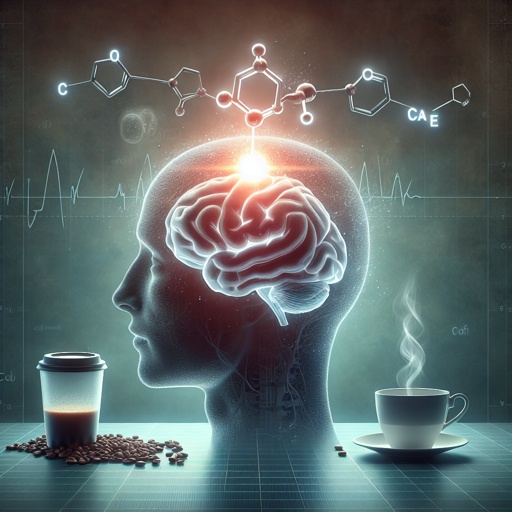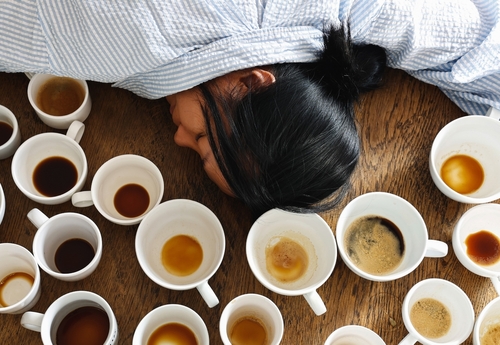Caffeine is a staple in many people’s daily routines, often used to jumpstart the day or as a quick pick-me-up. However, it’s important to understand how to avoid caffeine headaches. Excessive consumption can cause headaches and other symptoms such as a racing heart and anxiety. Abrupt cessation can lead to caffeine withdrawal headache, while for others, caffeine itself can act as a migraine trigger. In this blog post, we’ll explore the link between caffeine and headaches, and provide practical strategies to manage and prevent them effectively.
Can Caffeine Cause Headaches? Understanding Caffeine Triggered and Withdrawal Headaches
Yes, caffeine can indeed cause headaches. There are primarily two types of headaches associated with caffeine; caffeine triggered headaches and caffeine withdrawal headaches. There’s not a specific caffeine headache area of pain. It is typically a generalized headache throughout the whole head.
For some people, caffeine itself can act as a headache trigger. Some patients with migraine are susceptible to caffeine acting as a migraine trigger. (In all fairness though, caffeine can also help migraines for some too). For others, excess amounts of daily milligrams of caffeine can cause a lower level tension type headache.
Caffeine withdrawal headaches can develop within 24 hours after stopping regular caffeine intake, especially if you’ve been consuming more than 200 mg per day for at least two weeks. However, for some withdrawal can happen after even a small 8 ounce cup of joe first thing each morning. These headaches typically resolve on their own within two weeks if caffeine consumption is not resumed, or they can disappear within an hour if 100 mg of caffeine is consumed again. This is supported by research which shows the spontaneous resolution of such headaches. Additionally, symptoms like headaches, fatigue, mood changes, and impaired concentration may appear 12-24 hours after ceasing caffeine intake, as noted in studies observing symptoms post-withdrawal. Caffeine withdrawal headaches are similar to rebound headaches (medication overuse headache) seen in patients with migraine when they are using excess as needed (abortive) headache medicines.
Recognizing Symptoms of Caffeine-Related Headaches. Why Does Caffeine Give Me Headaches?
Understanding the symptoms of caffeine-related headaches is essential for effective management. These headaches can manifest in several ways, ranging from a throbbing pain that varies in intensity to dull achy tension headaches. A full blown migraine attack can be triggered in some patients from both caffeine itself as well as caffeine withdrawal.
High doses of caffeine, ranging between 400–800 mg at once, can lead to a range of adverse effects, including anxiety, nervousness, tremors, insomnia, and an increased heart rate, which are well-documented side effects of high caffeine intake. Excess caffeine can also cause fatal heart arrhythmias (rhythm disturbances). If you find these symptoms coinciding with your headaches, it’s likely your caffeine consumption may be too high, necessitating an adjustment.
Caffeine headaches can also occur when your intake disrupts your normal sleep patterns. Insufficient sleep or poor sleep quality can exacerbate headache frequency and severity. Thus, it’s critical to monitor how caffeine affects your sleep and make necessary adjustments to your consumption habits. For example, many people can not tolerate caffeine after noon because it causes them to have insomnia. A cup of black tea, green tea, or a simple cup of coffee during lunch may make them lie awake all night.
Another contributing factor to caffeine-related headaches is the fluctuating levels of caffeine in your system, and it’s effect on the adenosine receptors in your brain. Rapid increases or decreases can cause your blood vessels to constrict and dilate, triggering a headache. This is particularly common when you either consume too much caffeine in a short period or abruptly stop your intake.
Additionally, it’s worth noting the role of individual sensitivity to caffeine. Some people are more sensitive to caffeine’s effects due to genetic factors, leading to headaches even at lower doses. Paying attention to your body’s responses can help you identify your own tolerance levels. Seasoned coffee drinkers are usually pretty well in tune with how much caffeine use is too much for them.
Recognizing these symptoms and understanding the mechanisms behind caffeine-related headaches can empower you to make informed decisions about your caffeine consumption, thereby reducing the frequency and intensity of these headaches.
Importance of Proper Hydration in Preventing Caffeine Headaches
Hydration plays a pivotal role in mitigating caffeine headaches, and it’s an often-overlooked aspect of maintaining overall well-being. It is essential to prioritize drinking enough fluids throughout the day.
Pairing each cup of coffee or energy drink with a glass of water can help keep you adequately hydrated and counterbalance the diuretic effect of caffeine, which can lead to increased urination and subsequent fluid loss and dehydration. By ensuring that your fluid intake is consistent, you reduce the risk of dehydration headaches that may be mistakenly attributed to caffeine intake or withdrawal.
For those who find it challenging to remember to drink water regularly, consider setting reminders on your phone or using a water bottle with marked measurements to track your daily intake. Adding a slice of lemon or a splash of fruit juice to your water can also make it more palatable, encouraging you to drink more. A good rule of thumb to avoid dehydration headache is to drink half of your body weight in ounces of water each day. For example, someone weighing 200 pounds should drink 100 ounces of water daily.
It’s not just water that contributes to your hydration levels—other beverages such as herbal teas, coconut water, and even water-rich fruits and vegetables like cucumbers and watermelon can support your hydration needs. However, be mindful of beverages that contain added sugars or artificial ingredients, as they can have the opposite effect and contribute to dehydration.
Maintaining proper hydration can also support other bodily functions that might be compromised due to caffeine consumption, such as digestive health and skin elasticity. When your body is well-hydrated, it’s better equipped to handle the occasional intake of caffeinated beverages without succumbing to the adverse effects.
Incorporating electrolyte solutions into your hydration regimen can be particularly beneficial, especially if you are consuming high amounts of caffeine or engaging in activities that cause you to sweat. Electrolytes help maintain the balance of fluids in your body, ensuring that you stay hydrated and your cells function optimally.
Ultimately, understanding the importance of proper hydration in preventing caffeine headaches empowers you to make more informed choices about your fluid intake. By prioritizing hydration, you can enjoy the benefits of caffeine without the uncomfortable side effects of dehydration-induced headaches.
How to Get Rid of Caffeine Withdrawal Headache. Gradual Caffeine Reduction to Avoid Withdrawal Symptoms
Gradually reducing your caffeine intake is an effective strategy to mitigate withdrawal symptoms, including headaches. Abruptly cutting out caffeine can lead to significant discomfort, so it’s advisable to taper off slowly. Start by replacing one of your regular cups of coffee or energy drinks with a decaffeinated version or a non-caffeinated alternative. Decaf coffee has much less caffeine, but still has some, so switching to it won’t be an abrupt absence of caffeine. This gradual reduction helps your body adjust to lower levels of caffeine without yanking it away cold turkey, minimizing the likelihood of withdrawal headaches.
Research by Juliano et al. has shown that headaches are among the most frequently reported symptoms of caffeine withdrawal, appearing in a substantial number of studies, as reported in 77% of experimental studies on caffeine withdrawal. By decreasing your caffeine intake incrementally, you give your system time to adapt, which can lessen the severity and frequency of these headaches.
One effective approach is to reduce your caffeine consumption by about 10-20% each week. For instance, if you normally drink five cups of coffee a day, try cutting back to four and a half cups the first week, then four cups the next week, and so on. This very slow methodical reduction allows your body to adjust more comfortably without the sudden shock of caffeine deprivation.
Additionally, pay attention to your body’s signals during this process. If you notice that the headaches persist despite gradual reduction, it may be necessary to slow down the rate at which you decrease your caffeine intake. Some people may need to reduce their consumption even more slowly to avoid withdrawal symptoms entirely.
Remember, everyone’s tolerance to caffeine varies, so it’s important to find a pace that works for you. For those who consume caffeine in various forms, such as sodas, teas, or energy drinks, be mindful of the cumulative amount of caffeine you’re ingesting. By strategically and patiently reducing your intake, you can effectively manage and prevent caffeine withdrawal headaches.
Lifestyle Changes to Manage and Prevent Caffeine Headaches
Adopting certain lifestyle changes can play a significant role in managing and preventing caffeine headaches. One of the most effective strategies is to maintain a consistent sleep schedule. Aim to go to bed and wake up at the same time every day, even on weekends, to ensure your body gets the rest it needs. This can help you feel more energized naturally, reducing your reliance on caffeinated beverages to stay awake and alert.
Regular physical activity is another powerful tool in preventing caffeine headaches. Exercise can help lower stress levels and improve overall well-being, which can, in turn, reduce the frequency of headaches. Incorporate a mix of aerobic exercises, strength training, and flexibility workouts into your routine for the best results. Even simple activities like walking, yoga, or stretching can make a noticeable difference in how you feel.
Diet also plays a crucial role. Aim to eat balanced meals that include a variety of nutrients to keep your energy levels stable throughout the day. Foods rich in complex carbohydrates, proteins, and healthy fats can provide sustained energy and reduce the urge to consume caffeine. Include plenty of fruits, vegetables, whole grains, and lean proteins in your diet to maintain optimal health. Eating nutrient-rich foods and drinking plenty of fluids can provide your body with the necessary resources to manage the effects of caffeine more efficiently.
Taking time each day for mindfulness and stress management techniques can also be beneficial. Practices such as meditation, deep breathing exercises, yoga, and progressive muscle relaxation can help you manage stress, which is a common trigger for headaches. These practices help calm the nervous system and promote overall well-being, making them effective tools for managing caffeine headaches.
Lastly, be mindful of your caffeine sources and intake. Many people consume caffeine in various forms, including coffee, tea, sodas, and energy drinks, without realizing the cumulative amount they are ingesting. Keep track of all caffeinated products you consume to ensure you stay within a moderate range. By implementing these lifestyle changes, you can effectively manage and prevent caffeine headaches, allowing you to enjoy your day without the discomfort of a headache.
Natural Remedies to Alleviate Caffeine Headache Symptoms
When faced with caffeine headaches, several natural remedies can help alleviate the symptoms. Peppermint oil is widely recognized for its soothing properties. Applying a few drops to your temples and gently massaging can provide relief from headache pain. The cooling sensation from the menthol in peppermint oil helps relax muscle tension and improve blood flow.
Ginger tea is another effective remedy. Known for its anti-inflammatory and antioxidant properties, ginger can help reduce headache intensity. You can prepare fresh ginger tea by steeping slices of ginger root in hot water for 10-15 minutes. Drinking this tea can not only relieve headaches but also aid in digestion and reduce nausea, which sometimes accompanies migraines.
Acupuncture and acupressure have also shown promise in alleviating headache symptoms. Targeting specific pressure points can help relieve tension and improve circulation. If you’re new to these practices, consider consulting a certified practitioner to guide you through the process.
By exploring these natural remedies, you can find effective ways to manage caffeine headaches and enhance your overall health.
When to Seek Professional Medical Advice for Caffeine Headaches
Understanding when to seek professional medical advice for caffeine headaches is crucial for your health. While occasional headaches from caffeine withdrawal or overconsumption can often be managed with home remedies and lifestyle adjustments, certain situations warrant a more thorough evaluation by a healthcare provider. Any new headache, recurrent headache, or change in headache pattern should be discussed with your doctor. If your headaches are unusually severe, frequent, or persistent despite making changes to your caffeine intake and lifestyle, it could indicate a more serious underlying condition.
Additionally, if you experience symptoms such as visual disturbances, nausea, vomiting, or neurological issues like numbness or weakness, it’s imperative to seek immediate medical attention. These symptoms could suggest that the headaches are not solely related to caffeine but may be indicative of other health issues that require prompt diagnosis and treatment.
A healthcare provider can perform a comprehensive evaluation to rule out other potential causes and provide a tailored treatment plan. Moreover, if you find that your attempts to reduce caffeinated drinks are consistently unsuccessful and lead to significant withdrawal symptoms, professional guidance can be beneficial. A doctor can recommend strategies for tapering off caffeine safely and may suggest alternative treatments or therapies to manage withdrawal symptoms effectively.
If you have pre-existing medical conditions such as cardiovascular disease, hypertension, or anxiety disorders, consulting with a healthcare provider is particularly important. These conditions can be exacerbated by caffeine dependence, and a professional can help you create a personalized plan to manage your caffeine intake without compromising your overall health. Remember, addressing headaches with the help of a healthcare provider can lead to better long-term outcomes and a more comprehensive understanding of how caffeine impacts your body.
IF YOU HAVE HEADACHE, MIGRAINE, OR FACIAL PAIN AND ARE LOOKING FOR ANSWERS ON ANYTHING RELATED TO IT, A HEADACHE SPECIALIST IS HERE TO HELP, FOR FREE!
FIRST, LET’S DECIDE WHERE TO START:
IF YOU HAVE AN EXISTING HEADACHE, MIGRAINE, OR FACIAL PAIN DIAGNOSIS AND ARE LOOKING FOR THE LATEST INFORMATION, HOT TOPICS, AND TREATMENT TIPS, VISIT OUR FREE BLOG OF HOT TOPICS AND HEADACHE TIPS HERE. THIS IS WHERE I WRITE AND CONDENSE A BROAD VARIETY OF COMMON AND COMPLEX MIGRAINE AND HEADACHE RELATED TOPICS INTO THE IMPORTANT FACTS AND HIGHLIGHTS YOU NEED TO KNOW, ALONG WITH PROVIDING FIRST HAND CLINICAL EXPERIENCE FROM THE PERSPECTIVE OF A HEADACHE SPECIALIST.
IF YOU DON’T HAVE AN EXISTING HEADACHE, MIGRAINE, OR FACIAL PAIN DIAGNOSIS AND ARE LOOKING FOR POSSIBLE TYPES OF HEADACHES OR FACIAL PAINS BASED ON YOUR SYMPTOMS, USE THE FREE HEADACHE AND FACIAL PAIN SYMPTOM CHECKER TOOL DEVELOPED BY A HEADACHE SPECIALIST NEUROLOGIST HERE!
IF YOU HAVE AN EXISTING HEADACHE, MIGRAINE, OR FACIAL PAIN DIAGNOSIS AND ARE LOOKING FOR FURTHER EDUCATION AND SELF-RESEARCH ON YOUR DIAGNOSIS, VISIT OUR FREE EDUCATION CENTER HERE.



